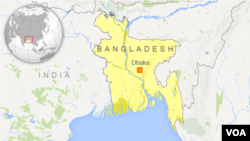A brazen attack by knife-wielding assailants riding motorcycles this week in Dhaka, the Bangladesh capital, left a constable dead and one officer injured at a police checkpoint.
The group that calls itself Islamic State (IS) claimed responsibility for the attack hours later in postings on its websites. It was the most recent in one of several acts of terror in Bangladesh that IS claimed in recent months.
Intelligence analysts say the impoverished nation is ripe for activities by IS extremists. There also are fears in Dhaka that IS could be plotting to use the country and Bangladeshis recruited from abroad as a springboard to spread its network in parts of Asia.
Officials in the capital at first sternly denied that IS was involved, but they now concede that the militant group appears to be a genuine threat.
“We are examining if there is an existence of IS in Bangladesh,” Information Minister Hasanul Haq Inu told VOA. The recent incidents were aimed “at destabilizing society,” he added.
IS has declared its members carried out two high-profile killings of foreigners: Italian aid-worker Cesare Tavella, 50, who was fatally shot on September 28 in Dhaka, and 55-year-old Japanese agriculturalist Kunio Hoshi, who was killed on October 3 in northern Bangladesh.
Other attacks claimed by IS targeted Bangladeshis, including a suicide attack on a Shi'ite procession in the capital last week that killed a teenager and another man and wounded dozens of others. That claim was verified by monitors from the U.S.-based SITE group, which studies and tracks terrorists' activities.
Violence claimed by the IS comes in the midst of a different wave of terrorism in Bangladesh that has targeted secularist bloggers and publishers since 2013.
In the most recent incident, a secular blogger was killed and three others were wounded in separate attacks in Dhaka last week. Al-Qaida in the Indian Subcontinent (AQIS) said it targeted them for making derogatory remarks about the Muslim faith.
The Bangladesh government has blamed most of the violence on home-grown terrorists and opposition politicians, saying the attacks were “an outcome of conspiracy” by local and international actors trying to undermine the government.
Al-Qaida and the Taliban have been involved in the violence, but Home Minister Asaduzzaman Khan Kamal told reporters recently that no links to the IS had been uncovered.
However, security expert Ishfaq llahi Choudhury told VOA’s Bangla Service that IS militants and violent domestic groups in Bangladesh are ideologically and philosophically similar.
“Some of the groups are using the name of IS in order to gain importance," he said.
Islamic State's suspected activities in Bangladesh reach far beyond Dhaka – halfway around the world to London, in fact.
VOA interviews in Britain found that IS has been actively recruiting Bangladeshis there to fight in Syria and Iraq.
A number of British-Bangladeshi young men and women from Tower Hamlets, a borough of London with a high proportion of Bangladeshi residents, are believed to have left Britain to join Islamic State fighters.
“IS propaganda is very active and social media is playing a great role,” college student Sadat Rashid, 19, told VOA.
At least seven young men and women of Bangladeshi origin have left their homes in Britain to join IS and other rebel groups in Syria, according to their former neighbors. And news reports tell of at least eight others – five men and three young girls – who left London to join in the fight.
The Foreign Office in London estimates that 500 British Muslims have traveled to Syria to join extremist groups; other reports put the number in the thousands.
“No matter where teens are - in Europe, America, Pakistan or Bangladesh - they are very vulnerable,” said Rushanra Ali, a member of Parliament who is British-Bengali.
Social media is a powerful recruiting tool for IS, she said, adding that “schools and society should all take this issue very seriously.”
Parents and families of young Bengalis believed to be in Syria refused VOA's requests for interviews.











